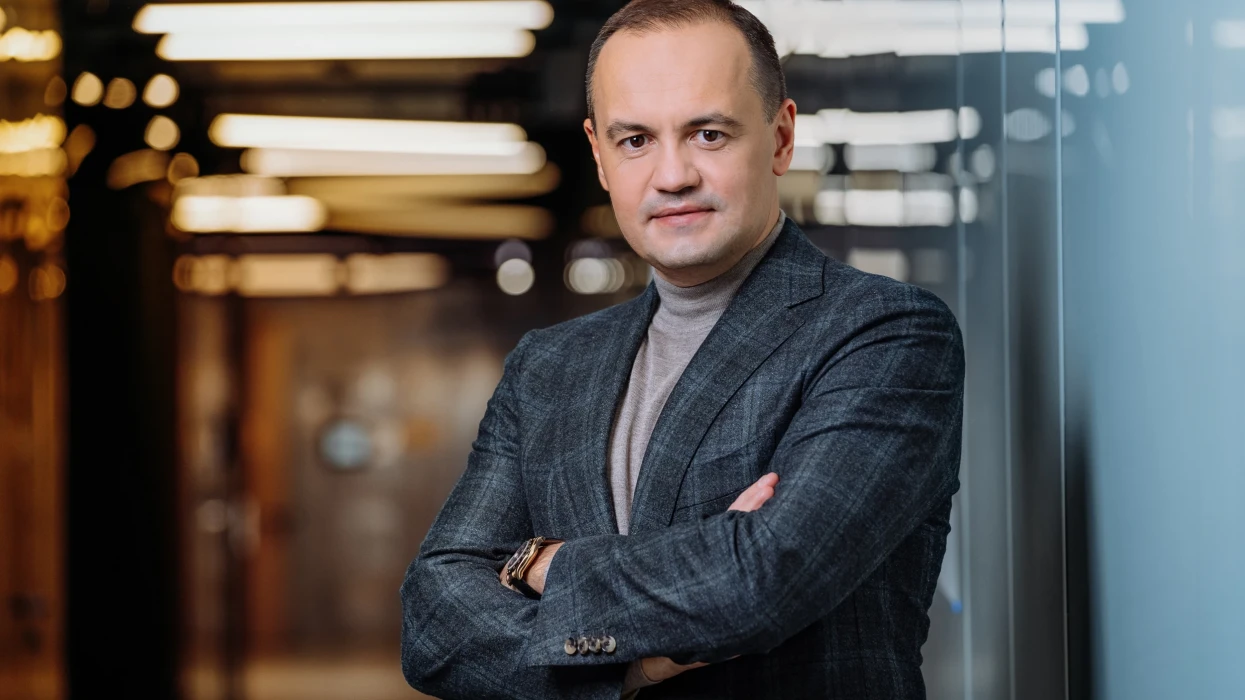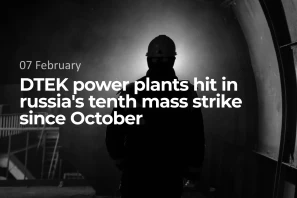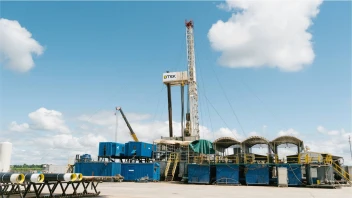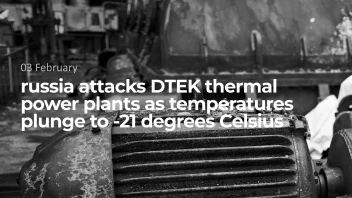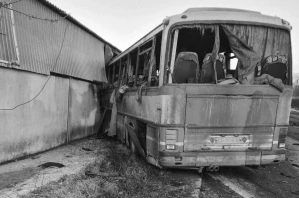Dear Mr Timchenko, first, let me congratulate DTEK on becoming member the German-Ukrainian Chamber of Industry and Commerce. We are glad to welcome you among us! We hope for fruitful cooperation. What exactly do you expect from cooperation with AHK Ukraine?
DTEK supports market reforms and transformation of the energy industry that makes Ukraine as close as possible to the EU Green Deal objectives. For DTEK, becoming a member of AHK means establishing effective cooperation with public organizations, experts, and companies from Germany - the country that is Ukraine's key partner in just transformation and implementation of innovations aimed at energy transition. I think DTEK membership in AHK will be mutually beneficial, long-lasting, and productive.
Mr Timchenko, this spring you already had a chance to take part in one of the most large-scale events co-organized by AHK Ukraine — the 4th German-Ukrainian Economic Forum in Berlin. What kind of experience have you and conclusions drawn? What achievements have you managed to bring home for DTEK?
During the 4th German-Ukrainian Economic Forum in Berlin, DTEK benefited from the great opportunity to discuss international cooperation in technological innovations, in particular, RES and green hydrogen production, with the authorities of both states (Ukraine and Germany), experts and business representatives, since these are now the urgent actions to combat climate change. I had a chance to participate in the discussion panel “Modern Solutions in the Energy Field and Green Deal” and present DTEK’s vision of new technologies introduction and business models search on the way to economy decarbonization and achievement of Ukraine's climate objectives as a European country. It was mentioned at the forum that success is possible only with international cooperation and partnership between states and businesses. In 2020, DTEK presented the New DTEK Strategy-2030 that clearly determines our goal — achievement of carbon neutrality by 2040. To attain such an ambitious goal, we are using partnership and international cooperation opportunities, introducing innovations and implementing new high-tech pilot projects, building new green generation capacities. That is DTEK’s contribution into the transformation of Ukraine’s energy sector in accordance with the Green Deal objectives.
Mr. Timchenko, one of the most relevant current topics in the field of energy is its decarbonization. According to the European Green Deal, Ukraine must also move over to carbon-free economy. How would you describe the current process of implementing the policy of decarbonization and greenhouse gas emission reduction in Ukraine?
The world is on its way to large-scale changes without which it is impossible to resist climate challenges. Decarbonization has become one of the fundamental trends no company or country can ignore now. Compared to 1990, Ukraine intends to reduce its greenhouse gas emissions by 35% by 2030 through decarbonization and RES development. In order to achieve this ambitious goal, we need to have the reforms put in place and ensure transparent investment conditions. Over the past several years, Ukraine has managed to make a real breakthrough in RES development and start green energy generation from scratch, which currently amounts to 8% of total electricity generation. At the same time, there is even more ambitious long-term objective set in the ENergy STartegy of Ukraine: the share of renewable energy should amount to 25% in the primary energy consumption by 2035. Construction of new RES capacities and introduction of new technologies requires involvement of investment, which is possible only with transparent and stable rules of the game, equal for everyone, and upon availability of attractive conditions and state guarantees for investors. DTEK, as a business, has taken the path of transformation, that meets global trends. The process of decarbonization plays an important role in the ESG-strategy of the company. Our strategic goal is to achieve carbon neutrality by 2040. In practical terms, it means for us that we will gradually reduce the volume of coal mining and coal power generation. Instead, we actively invest into renewable energies, digital networks, innovations, and new technologies. Our goal is that DTEK will produce at least 33% of electricity at solar and wind power plants by 2030. The company has already invested EUR 1.5 bn. Thanks to the operation of our solar and wind power plants, greenhouse gas emissions in 2020 reduced by 2.5 m tons. In 2021, DTEK started cooperating with the Danish company Vestas in the construction of Tylihul wind power plant with the capacity of 500 MW, that will be commissioned in 2022. That is a proof of our serious intentions and a clear signal for our partners concerning the scope of DTEK transformations. Another, no less important direction of our development, that will contribute to the achievement of national goals related to economy decarbonization, will be the use of hydrogen as the energy source. DTEK is already taking specific steps in this direction and closely considering several pilot projects for possible implementation, in particular, the ones involving European partners. Our goal is production of environmentally-friendly hydrogen to meet Ukraine’s needs and to export it to the EU as gas, liquid, or chemical carriers like green ammonia or liquid organic hydrogen carriers (LOHC). Implementation of these plans with partners’ help will make it possible to create a new industrial eco-system and a whole range of new national business clusters that will be integrated into the EU economy. In that way DTEK intends to make a considerable contribution into economy decarbonization in Ukraine and Europe in general.
What are your ideas regarding just transformation...?
Discussion of just transformation in Ukraine involves international experts and international experience and is held within the European platform “Just Transition” that was established five years ago with DTEK’s support. It should primarily be mentioned that transformation of the coal industry and coal regions stands for the project of construction of the new economic, environmental, and sustainable future of those regions, training people of new professions. Last year we developed and implemented a pilot project in Dobropillia, where jointly with communities, our employees, representatives of small and medium-sized businesses operating in this region we developed the economic regional development map and determined how people who used to work in the mines could be involved in new production facilities. The key task in this process is to make new productions profitable, for the budget of those towns not to depend that much on mines in the future, but rather on the new production facilities. According to the pilot project objectives, two thousand jobs and more than 60 types of new businesses and companies will be created. Another example is the town of Enerhodar, where DTEK has launched the first energy storage system in Ukraine, at Zaporizhzhia CHP plant. This is a pilot project that opens up new opportunities for the application of Zaporizhzhia CHP plant staff expertise and creates new professions in the energy sector. DTEK shares its best practice from the pilot projects with its colleagues and partners, since the process of transformation of coal mining regions may be successful as the result of joint effort of the state, private businesses, and international partners. We hope that the elaborated roadmap that is now being developed by the government along with the support provided by our Western partners, primarily, those from Germany, will make it possible to give clarity and confidence to all the residents of the coal mining regions.
Environmental protection is a super-important topic for an energy company. What interesting projects do you have in this field?
Combating climate change, reduction of emissions into the atmosphere, and biodiversity protection constitute our key directions related to environmental protection. Systemic environmental upgrade of capacities of the DTEK Group companies ensures production reliability and compliance with requirements of the European environmental standards.. DTEK treats the effect of its production activities on the environment and social sphere in a responsible way. DTEK has integrated 12 Sustainable Development Goals of the UN into its ESG-strategy until 2030. As of today, the companies have invested
more than EUR 568 m into environmental actions. This invetsment will have a positive effect on the preservation and restoration of biodiversity as well as decarbonization. DTEK is implementing the program of efficient industrial waste re-use. Over 99 % of the waste are safe, but require free areas for their disposal. Therefore, one of the key tasks in the field of environmental protection is increased application of large-tonnage waste, rock, and bottom ash materials that can be used in a number of infrastructural and construction projects of Ukraine. Here a pilot project of eco slab production from solid domestic waste could be given as an example. This project has been developed by a team of DTEK staff within their training at the Executive MBA Energy of Innovation program delivered by the DTEK Academy. The project aims to settle several tasks at a time, which include plastic waste disposal and environmental load reduction, establishment of waste processing mini-units and provision of new jobs, as well as establishment of the waste sorting and waste recovery culture. The plan is to replicate this project in other regions as well.
Mr. Timchenko, which of the DTEK’s social responsibility projects are you most proud of?
DTEK has been the first in Ukraine to develop and implement its development strategy following the ESG principles (Environmental, Social, Governance). We, as a socially responsible company, clearly realize that now business should be developed with due account of the interests of all stakeholders — employees, partners, shareholders, and communities where our production capacities are located. Within the range of our projects aimed at the ESG principles implementation there may be pointed out the project “Community with Its Own Hands”. “Community with Its Own Hands” is a grant contest organized by DTEK, aimed at ensuring welfare of inhabited settlements and developing local cooperation between the community, business, and administrations. The goal of the contest is to make local communities active for the sake of social infrastructure improvement. The project has been functioning since 2013 in the territories where the DTEK business is represented. All in all, 32 communities in 11 regions of Ukraine have participated in the contest. Each volunteer can submit an application for the implementation of a project aimed at the community welfare, and after that the tender commission determines the winning projects, and some funding will be allocated. This year was the first time when a specil emphasis was laid on the establisment of a barrier-free environment and inclusiveness in the broad sense. That presupposes development of an accessible socially-oriented infrastructure for people with disabilities and socially unprotected strata of the society. Other important DTEK projects in the social field are interregional projects “Energy-Efficient Schools: New Generation” (that is an educational energy-efficient program for schoolchildren of the 6th– 11th grades), as well as the project “Play!” aiming to popularize football and healthy lifestyle among children in Ukraine. Over the whole period of functioning of the Social Partnership Program, DTEK has implemented over 2,392 projects for community development in different regions of Ukraine. For us, social projects are a part of DTEK’s mission of promoting values based on the UN Sustainable Development Goals. Our company is a member of the UN Global Compact in Ukraine.
Digital transformation runs like a golden thread through all the areas of our life. DTEK has even established the units of innovations and digital transformation of business. Can you share the information as to how much DTEK spends on innovations per year?
Innovations and digital technologies enable to accelerate the process of transformation of the Ukrainian energy sector. Realizing the importance of digital transformation and innovation implementation, DTEK has split these processes into two directions. Thus, in 2019 the directorate for innovations was established, and the digital transformation program MODUS was launched. The directorate for innovations is introducing the culture of open innovations and works within three horizons of the innovative idea search. The first one is the search of innovative solutions aimed at improving economic profitability of business, the level of security and eco-friendliness of production capacities. The second one deals with solutions aiming to adapt to changes in the energy field, that is additional ways of monetizing the company’s traditional business. The third one stands for the establishment of new
business and business models that are not related to energy. One of the tasks of the directorate for innovations is to the develop the company’s culture of open innovations since innovations are not just technologies. People and their openness to changes form the basis of the company’s ability to transform via innovations, new technologies, and breakthrough solutions. Therefore, there is an ID.School in the DTEK Academy, that enables all the company’s employees to suggest their innovative solutions the best of which will be implemented. This year, we have launched one of the key projects of the directorate for innovations - the first industrial lithium-ion energy storage system in Ukraine (CHE) with the capacity of 1 MW and the output of 2.25 MW/hour. That is DTEK’s pilot project dealing with the search of optimal models of CHE operation in different segments of the country’s energy market. In 2019, DTEK’s digital transformation program MODUS implemented in three waves was launched. The first-wave projects are digital products and solutions for mines, CHP plants, networks, logistics, and HR. In 2020 the second wave was added — these are projects related to digital procurement, deposits, analytics, and office. Now the MODUS program is launching the third-wave projects — renewable energies and customer service. The projects implemented within this program include creation of the digital twin of Semyrenkivske field for DTEK Naftohaz. This twin helps to predict the “behaviour” of the field in different circumstances, therefore, enabling to better manage the gas production process, recover larger volumes, in a more efficient and safer way. Also, an innovative technology has been used at Prymorsk wind power plant – the “digital” subplant that enables to assess the status of equipment in real-time mode and automatically reacts to damages and failures. And in 2020, DTEK Enerho laid underground Wi-Fi connection at “Yuvileyna” mine for the first time in the history of Ukraine at the depth of 510 metres: this project has been included into the Book of Records of Ukraine as the first and deepest connection in the country. All these solutions are important for the development of new standards of doing safer, more technological and environmentally-friendly business in Ukraine. And this also produces some economic effect, which as of June 2021 earned about EUR 15 m.



